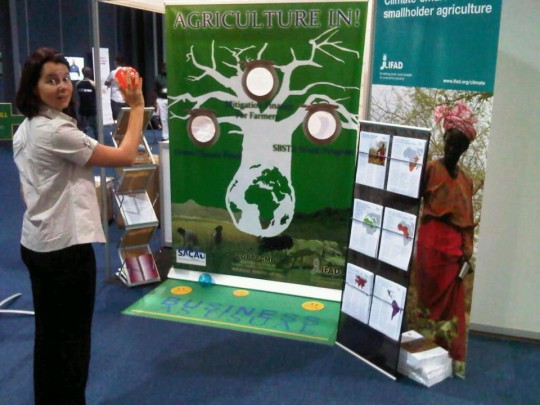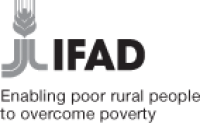UN official underlines link between food security and climate change
UN official underlines link between food security and climate change
Playing a ball game at the IFAD booth at the UN Climate Change Conference in Durban, South Africa
2 December 2011 –
“There is no trade-off between feeding people and saving our Planet,” said Kanayo F. Nwanze, the President of the UN International Fund for Agricultural Development (IFAD), who is attending the UN Climate Change Conference in Durban, South Africa.
“It is clear that food security and climate change, humanity’s two greatest challenges in the 21st century, are inextricably linked.”
According to IFAD, the world’s 500 million smallholder farms will have to significantly increase production over the next four decades to keep pace with a growing global population. They are required to do that in the face of more frequent extreme weather events and shifting weather conditions caused by climate change.
Prior to his departure for Durban, Mr. Nwanze stressed that despite the slow pace of climate negotiations, IFAD is observing “significant, tangible changes” in developing countries towards sustainable agriculture.
“Out in their fields, farmers are already adapting to the changing climate and realizing that they must respect and preserve the environment if they are to feed their families and produce a surplus for markets,” he said. “And policymakers at the country level are citing the impact of extreme weather on their crop production and asking for climate change to be addressed in rural development projects.”
Mr. Nwanze noted that global investment in agriculture had dropped by half over the past 30 years, and called for greater efforts towards expanding public investment in research to build farmers’ resilience to climate change and to support their adoption of sustainable agricultural practices.
IFAD-supported initiatives in Burkina Faso, China, Ethiopia, Peru and elsewhere are showing success in helping poor farmers increase their productivity and incomes. The farmers make maximum use of natural processes, thus reducing the need for environmentally harmful external inputs.
“There is already a scaling up of sustainable agricultural practices in many parts of the world,” said Mr. Nwanze. “What we need now is a rapid acceleration of these changes so that smallholder farmers can successfully feed their families, connect to markets and contribute more to global food production,” he added.
Meanwhile, IFAD, the UN Food and Agriculture Organization (FAO) and UN World Food Programme (WFP) have assisted over 22 million people hardest hit by the global food price crisis thanks to generous funding from the European Union’s Food Facility (EUFF), demonstrating that investing in agriculture and nutrition improves global food security.
The combined effects of high food prices in 2007-2008 and the global financial and economic downturn pushed millions of people into poverty and hunger. By the end of 2008, when the number of undernourished people neared one billion, the EU launched the €1 billion facility.
Set up in close collaboration with the UN High-Level Task Force on the Global Food Security Crisis, EUFF channelled some €367 million through FAO, IFAD and WFP to bridge the gap between short-term emergency needs and longer-term development by boosting agricultural production and productivity in countries hardest hit by the crises, the three agencies said in a joint statement.
###
UN rural development agency says climate change and food security challenges ‘inextricably linked’
At Durban conference, IFAD President highlights potential of smallholder agriculture
Rome/Durban, 2 December 2011 – The President of the International Fund for Agricultural Development (IFAD), Kanayo F. Nwanze, urged negotiators at the global climate change conference to recognize that “there is no trade-off between feeding people and saving our planet.”
“It is clear that food security and climate change, humanity’s two greatest challenges in the 21st century, are inextricably linked,” Nwanze said.
Nwanze will give a keynote address at the Agriculture and Rural Development Day (ARDD) event on 3 December, accompanying the 17th Conference of the Parties (COP17) to the United Nations Framework Convention on Climate Change (UNFCCC).
“Negotiators need to recognize the critical importance of enabling smallholder farmers to become more resilient to climate change and to grow more food in environmentally sustainable, climate-smart ways,” he added.
According to IFAD, the world’s 500 million smallholder farms will have to significantly increase their production over the next four decades to keep pace with a growing global population. And they will have to do it in the face of more frequent extreme weather events and shifting weather conditions brought by climate change.
Prior to his departure for Durban, Nwanze stressed that despite the slow pace of climate negotiations, IFAD is now seeing “significant, tangible changes” in developing countries towards sustainable agriculture.
“Out in their fields, farmers are already adapting to the changing climate and realizing that they must respect and preserve the environment if they are to feed their families and produce a surplus for markets,” Nwanze said. “And policymakers at the country level are citing the impact of extreme weather on their crop production and asking for climate change to be addressed in rural development projects.”
Noting that global investment in agriculture had dropped by half over the past 30 years, Nwanze said efforts should be directed at expanding public investment in research to build farmers’ resilience to climate change and to support their adoption of sustainable agricultural practices.
IFAD-supported initiatives in Burkina Faso, China, Ethiopia, Peru and elsewhere are showing success in helping poor farmers increase their productivity and incomes. These farmers make maximum use of natural processes, thereby reducing the need for environmentally harmful external inputs.
“There is already a scaling up of sustainable agricultural practices in many parts of the world,” Nwanze added. “What we need now is a rapid acceleration of these changes so that smallholder farmers can successfully feed their families, connect to markets and contribute more to global food production.”
###
The International Fund for Agricultural Development (IFAD), a specialized agency of the United Nations, was established as an international financial institution in 1977 as one of the major outcomes of the 1974 World Food Conference. The Conference was organized in response to the food crises of the early 1970s that primarily affected the Sahelian countries of Africa. The conference resolved that “an International Fund for Agricultural Development should be established immediately to finance agricultural development projects primarily for food production in the developing countries”. One of the most important insights emerging from the conference was that the causes of food insecurity and famine were not so much failures in food production, but structural problems relating to poverty and to the fact that the majority of the developing world’s poor populations were concentrated in rural areas.
IFAD is dedicated to eradicating rural poverty in developing countries. Seventy-five per cent of the world’s poorest people – 1.4 billion women, children and men – live in rural areas and depend on agriculture and related activities for their livelihoods.
Working with rural poor people, governments, donors, non-governmental organizations and many other partners, IFAD focuses on country-specific solutions, which can involve increasing rural poor peoples’ access to financial services, markets, technology, land and other natural resources.
IFAD’s mission is to enable poor rural people to overcome poverty.
* Official website: http://www.ifad.org/
###
> United Nations (UN).
 The United Nations was established on 24 October 1945 by 51 countries committed to preserving peace through international cooperation and collective security. Today, nearly every nation in the world belongs to the UN: membership totals 192 countries.
The United Nations was established on 24 October 1945 by 51 countries committed to preserving peace through international cooperation and collective security. Today, nearly every nation in the world belongs to the UN: membership totals 192 countries.
When States become Members of the United Nations, they agree to accept the obligations of the UN Charter, an international treaty that sets out basic principles of international relations. According to the Charter, the UN has four purposes:
- to maintain international peace and security;
- to develop friendly relations among nations;
- to cooperate in solving international problems and in promoting respect for human rights;
- and to be a centre for harmonizing the actions of nations.
###
* The above story is adapted from materials provided by United Nations (UN)
** More information at United Nations (UN)






















